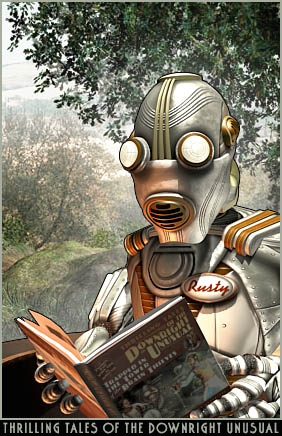
 Sommer Leigh has written a pretty thorough description of the retro futurist genres that (mostly) end in the suffix "punk".
Sommer Leigh has written a pretty thorough description of the retro futurist genres that (mostly) end in the suffix "punk".
I’ve said before that I’m not all that crazy about labels of this kind, and it’s partly because apart from the first of these – cyberpunk – the punk suffix is completely meaningless.
In William Gibson’s Neuromancer
and in at least its first descendants, "punk" really did belong in the name. The technological marvels of these futures were not there to benefit people. They were there to cement the power of large corporations and organizations. The fact that a disenfranchised few on society’s fringes were able to subvert those technologies to their own ends is what made them punks, in the punk rock sense. They were standing on its head the mechanism of power and making something personal and subversive out of it.
But then the word became popular, and shortly afterward it became meaningless, as we see in all the labels that have followed.
Leigh touches on this in her description of steampunk, which is nice to see. Heck, it’s always nice to see people thinking about the meanings of the words they use.
Apart from my own crotchety observations, then, Sommer Leigh has come up with short form descriptions of what each of these labels gets stuck on which should be useful to anybody who wants to use them. (Did I say I was done being crotchety? Oh well. And get off my lawn, there, you kids!)
Consider it a field guide to spotting these words when they’re thrown around in the wild. There are some nice examples cited except, oddly, for the one label I rather like. That’s "Raygun Gothic". Why do I forgive that particular label? First off, there’s no meaningless suffix – what a relief! But despite that, if you take a good look at it "Raygun Gothic" doesn’t seem to mean much, either. It’s just such a… pretty phrase, I guess, and sort of evocative, so I find myself smiling at it even though it, too, seems to be playing on my lawn.




Why not just call it retro-futurism? Or is someone just trying to get their own bookshelf space at Barnes & Noble for their upcoming books? Retro is a good word to use still.
I’m mostly in favor of avoiding labels altogether…. though I guess I do sometimes use them. Mainly, though, I sprinkle them into meta keywords and page descriptions, to feed them to Google. Because no matter how crotchety I might be, people do still use (and search for) them.
The ‘punk’ in Steampunk refers to the ‘do it yourself’ attitude of makers and tinkerers, like the Punks who made their own clothes. I’m a fan of Retro Futurism be it set in a psuedo Victorian world or the Jungles of Mongo.
I can see how that definition would look reasonable now, but if you figure that’s what the word meant when it first bubbled up then I think you’ve got a sort of chicken or the egg problem, haven’t you? Since nobody was actually making clothes at the time?